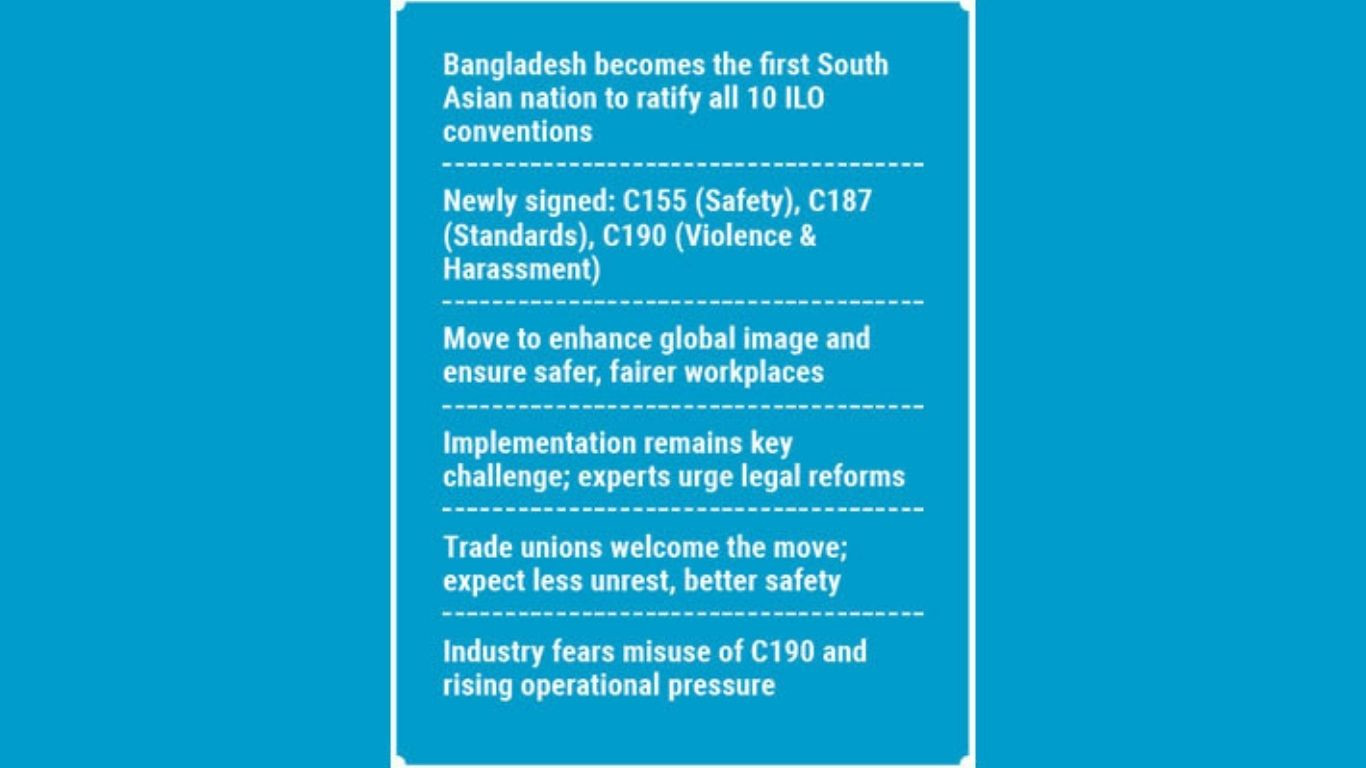
The interim government has signed three new conventions of the International Labour Organization (ILO), making Bangladesh the first South Asian country to ratify all 10 fundamental ILO conventions.
Labour experts hailed the move as a milestone that will enhance Bangladesh’s global image and ensure safer, more equitable workplaces. However, factory owners voiced concerns about potential challenges in implementing the new standards.
Speaking to the Daily Sun, Syed Sultan Uddin Ahmed, Executive Director of the Bangladesh Institute of Labour Studies (BILS) and Chairperson of the Labour Law Reform Commission, welcomed the development. “This is a positive initiative. It will brighten Bangladesh’s international image and help ensure better, safer workplaces for workers,” he said.
Sultan Uddin urged the government to prepare a comprehensive work plan to implement the conventions effectively.
“Some laws will now need to be amended. If implemented properly, both workers and factory owners will benefit through improved productivity,” he said, adding that the government’s decision followed recommendations from the reform commission and long-standing worker demands.
Labour leaders hail the decision
Md Towhidur Rahman, Chairman of the Bangladesh Garment Workers Unity Council (BGWUC), thanked the interim government for ratifying the ILO conventions.
“By signing these conventions, the government has proved it is labour-friendly. Workers’ health and safety were often neglected before, but this will bring positive change,” he said.
Towhidur added that the next elected government will be obligated to align new labour laws with the conventions.
“No future government can avoid them, as Bangladesh is now bound by international commitment. I also believe labour unrest will decline from now on,” he noted.
Industry leaders express concern
However, some industry representatives expressed reservations. Mohammad Hatem, Executive President of the Bangladesh Knitwear Manufacturers and Exporters Association (BKMEA), warned that the new commitments might create challenges for the sector.
“The government has shown great enthusiasm in signing these conventions. But even major economies like China, India, South Korea and the U.S. have not ratified Convention 190. This could put our industries at a disadvantage,” he said.
Hatem cautioned that the conventions might be “misused” to file harassment claims against factory owners, potentially increasing unrest.
“Our factories already maintain good labour standards and pay competitive wages. But excessive compliance pressure could harm operations,” he added.
Labour Law (Amendment) Ordinance, 2025 gets final approval
Meanwhile, the Advisory Council on Thursday gave policy-level and final approval to the draft of the Bangladesh Labour Law (Amendment) Ordinance, 2025, aiming to modernise labour laws and align them with international standards.
The decision was made at the weekly meeting of the Council of Advisers held at the Chief Adviser’s Office in Tejgaon, chaired by Chief Adviser Professor Muhammad Yunus.
Briefing the media, Law Adviser Professor Asif Nazrul said the Council also approved the Representation of the People (Amendment) Ordinance, 2025, along with four other draft laws in principle.
“The Labour Law amendment seeks to make the legal framework more modern, internationally compliant, and balanced for both workers and employers,” Nazrul said.
______________________________________________
The reporter can be reached at:[email protected]
Edited by: Anayetur Rahaman


